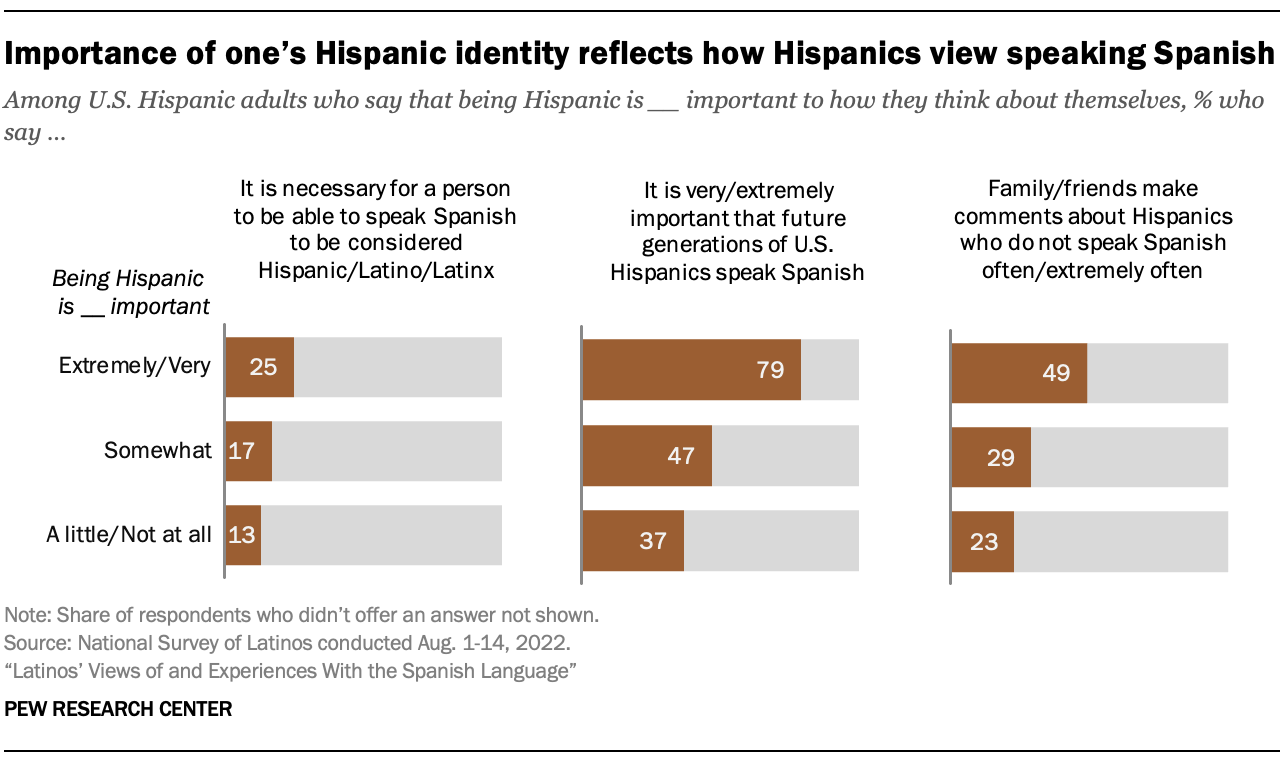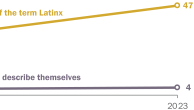About half of U.S. Latinos who do not speak Spanish have been shamed by other Latinos for it

Pew Research Center conducted this study to understand current views of the Spanish language among U.S. Hispanics, including views related to Hispanic identity, joking about Hispanics who do not speak Spanish well or at all, and the use of Spanglish – a combination of Spanish and English.
For this analysis, we surveyed 7,647 U.S. adults, including 3,029 Hispanics, from Aug. 1 to 14, 2022. This includes 1,407 Hispanic adults on Pew Research Center’s American Trends Panel (ATP) and 1,622 Hispanic adults on Ipsos’ KnowledgePanel. Respondents on both panels are recruited through national, random sampling of residential addresses. Recruiting panelists by phone or mail ensures that nearly all U.S. adults have a chance of selection. This gives us confidence that any sample can represent the whole population, or in this case the whole U.S. Hispanic population. (See our “Methods 101” explainer on random sampling for more details.)
To further ensure the survey reflects a balanced cross-section of the nation’s Hispanic adults, the data is weighted to match the U.S. Hispanic adult population by age, gender, education, nativity, Hispanic origin group and other categories. Read more about the ATP’s methodology. Here are the questions used for our survey of Hispanic adults, along with responses, and its methodology.
The terms Hispanic and Latino are used interchangeably in this report.
U.S. born refers to persons born in the 50 states or the District of Columbia and those born in other countries to parents of whom at least one was a U.S. citizen.
Foreign born refers to persons born outside of the United States to parents neither of whom was a U.S. citizen. For the purposes of this report, foreign born also refers to those born in Puerto Rico. Although individuals born in Puerto Rico are U.S. citizens by birth, they are grouped with the foreign born because they are born into a Spanish-dominant culture and because on many points their attitudes, views and beliefs are much closer to those of Hispanics born outside the U.S. than to Hispanics born in the 50 states or the District of Columbia, even those who identify themselves as being of Puerto Rican origin.
The terms foreign born and immigrant are used interchangeably in this report.
Second generation refers to people born in the 50 states or the District of Columbia with at least one parent born in Puerto Rico or another country.
Third or higher generation refers to people born in the 50 states or the District of Columbia, with both parents born in the 50 states or the District of Columbia.
Language dominance is a composite measure based on self-described assessments of speaking and reading abilities. Spanish-dominant people are more proficient in Spanish than in English (i.e., they speak and read Spanish “very well” or “pretty well” but rate their English-speaking and reading ability lower). Bilingual refers to people who are proficient in both English and Spanish. English-dominant people are more proficient in English than in Spanish.
Most U.S. Latinos speak Spanish: 75% say they are able to carry on a conversation in Spanish pretty well or very well. And most Latinos (85%) say it is at least somewhat important for future generations of Latinos in the United States to speak Spanish.
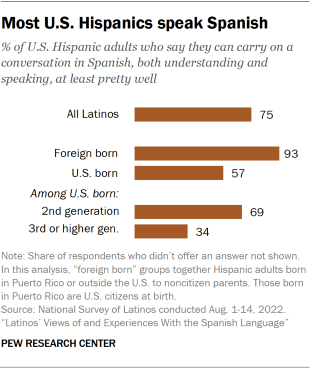
But not all Hispanics are Spanish speakers, and about half (54%) of non-Spanish-speaking Hispanics have been shamed by other Hispanics for not speaking Spanish.
At the same time, 78% of U.S. Hispanics say it is not necessary to speak Spanish in order to be considered Hispanic.
We asked U.S. Latinos about their views, attitudes and experiences with the Spanish language. Here is what we found.
Key findings:
- While most U.S. Latinos speak Spanish, not all do. 24% of all Latino adults say they can only carry on a conversation in Spanish a little or not at all. Among third- or higher-generation Latinos, a much higher share are not Spanish speakers: Close to two-thirds (65%) of third- or higher-generation Latinos say they cannot carry on a conversation well in Spanish.
- About half of U.S. Hispanics who do not speak Spanish have been shamed because of it. 54% of Hispanics who say they speak no more than a little Spanish say another Hispanic person has made them feel bad for it.
- Some Hispanics make jokes about those who do not speak Spanish. Four-in-ten Hispanic adults say they hear other Hispanics make jokes, extremely often or often, about Hispanics who do not speak Spanish or don’t speak it well.
- Spanglish use is widespread among U.S. Hispanics. 63% report speaking Spanglish, a combination of Spanish and English, at least sometimes.
- Personal Hispanic identity is related to views about Spanish. U.S. Hispanics who consider their Hispanic identity to be extremely or very important to how they think about themselves are more likely than other Hispanics to say it’s important for future generations to speak Spanish. They are also more likely to say it is necessary for someone to speak Spanish in order to be considered Hispanic.
Speaking Spanish can be an important skill, a means of communication and a marker of identity for U.S. Latinos. The Spanish language is a source of pride for some, and many Latino parents encourage their U.S.-born children to speak it. Importantly, the United States has one of the world’s largest Spanish-speaking populations.
For this report, Pew Research Center surveyed a nationally representative sample of 3,029 U.S. Latino adults, in English and Spanish, from Aug. 1 to 14, 2022. Findings among the sample often differ by nativity, immigrant generation, age, educational attainment and language use.
Spanish speaking and its importance in Latino identity
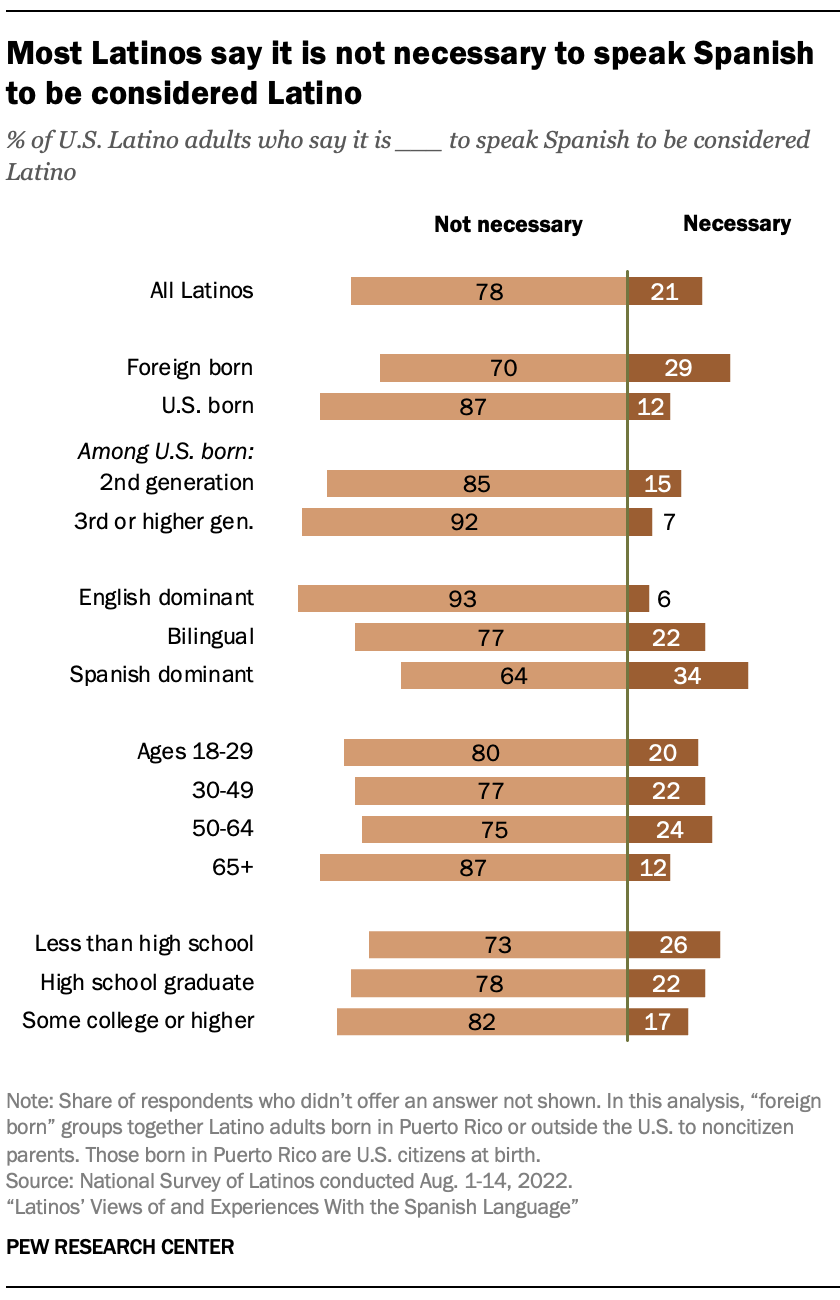
Latino identity in the U.S. can be shaped by many factors. One of them is speaking Spanish, which some Latinos use to distinguish who is Latino from who is not. Yet most Latino adults (78%) say it is not necessary to speak Spanish to be considered Latino, while 21% say it is.
While strong majorities among major Latino demographic subgroups say it is not necessary to speak Spanish to be considered Latino, there are some notable differences in views.
- Latino immigrants are less likely than U.S.-born Latinos to say speaking Spanish is not necessary to be considered Latino – 70% vs. 87%.
- Just 7% of third- or higher-generation Latinos (the Latino U.S.-born children of U.S.-born parents) say it is necessary for someone to speak Spanish to be Latino.1
- Spanish-dominant Hispanics (34%) are more likely than bilingual (22%) and English-dominant (6%) Hispanics to say speaking Spanish is necessary for a person to be considered Hispanic.
Importance of future U.S. Latino generations speaking Spanish
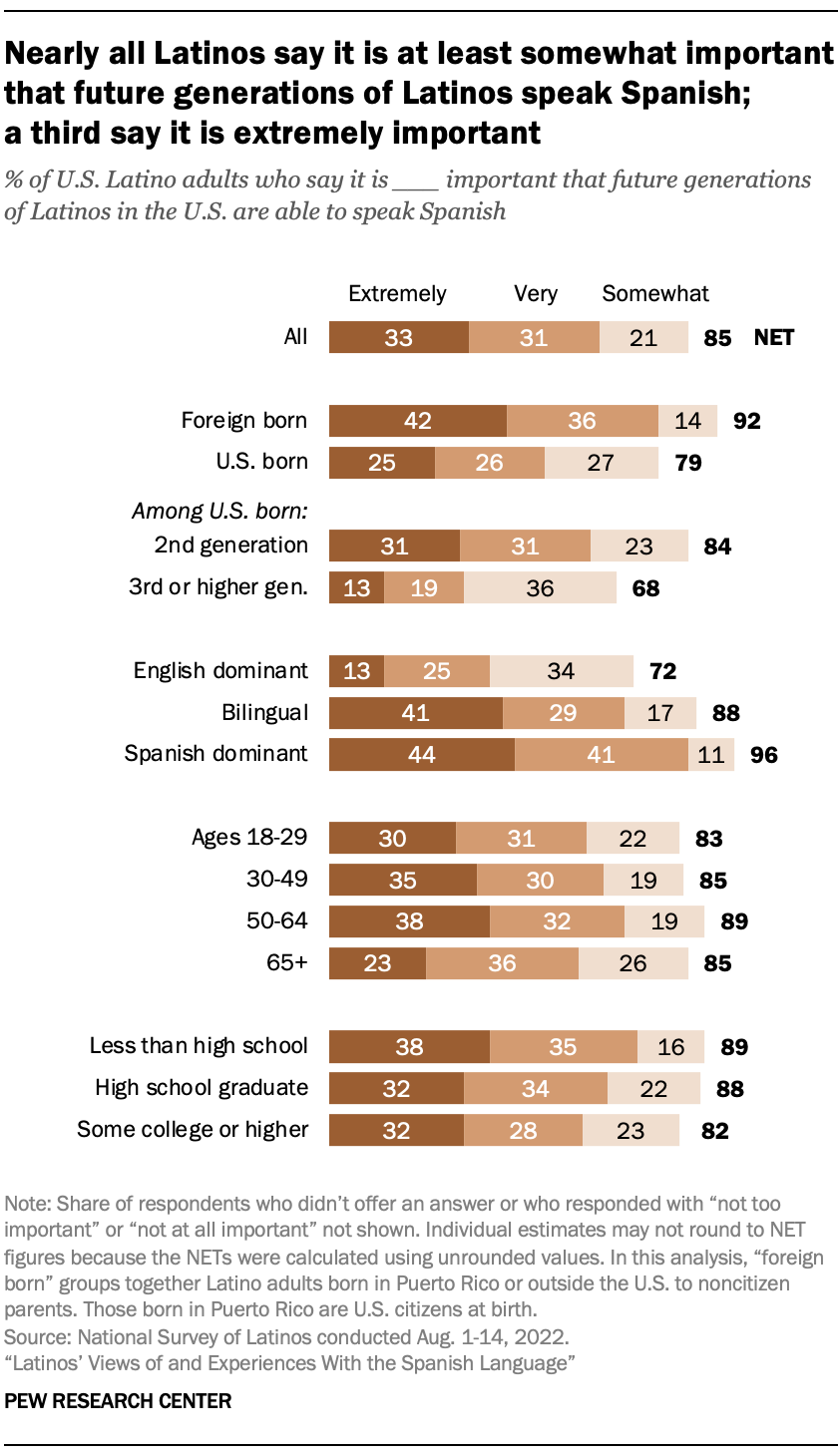
While most Latinos say speaking Spanish is not necessary to be considered Latino, most agree it is important for future generations to speak it.
A majority of Latinos (65%) say it is at least very important that future generations of Latinos in the U.S. speak Spanish, including a third who say it is extremely important. Only 5% say it’s not at all important.
Immigrant and U.S.-born Latinos and the future of Spanish in the U.S.
Immigrant Latinos are more likely than U.S.-born Latinos to say it is important that future generations of U.S. Latinos can speak Spanish.
- 42% of Latino immigrants say it’s extremely important for future U.S. generations of Latinos to speak Spanish.
- A quarter of U.S.-born Latinos say the same.
- A fifth of U.S.-born Latinos say it is not too or not at all important, while only 7% of foreign-born Latinos say the same.
Among U.S.-born Latinos, the importance of future generations speaking Spanish decreases among later immigrant generations
- About three-in-ten second-generation Latinos (31%) say it is extremely important that future U.S. Latinos speak Spanish.
- Among third- or higher-generation Latinos, about a third (32%) say it is extremely or very important for future generations of U.S. Latinos to speak Spanish, including just 13% who say it’s extremely important.
- By contrast, three-in-ten third- or higher-generation Latinos say it is not too or not at all important that future generations of Latinos are able to speak Spanish.
How Spanish language use affects U.S. Hispanics’ views of the future of Spanish in the U.S.
The importance of future generations of U.S. Hispanics speaking Spanish is strongly related to whether they are Spanish dominant, bilingual or English dominant.
- Virtually all Spanish-dominant Hispanics (96%) say it is at least somewhat important for future generations of U.S. Hispanics to speak Spanish, including 44% who say it is extremely important.
- Among English-dominant Hispanics, 72% say this is at least somewhat important, with only 13% saying it is extremely important.
Political party affiliation and views of the future of Spanish
Hispanic Democrats are slightly more likely than Hispanic Republicans to say it is important for future generations of Hispanics in the U.S. to speak Spanish.
- Close to nine-in-ten Democratic and Democratic-leaning Hispanics (88%) say this is at least somewhat important, with 36% saying it is extremely important.
- 80% of Republican and Republican-leaning Hispanics say it is at least somewhat important for future generations of U.S. Hispanics to speak Spanish, with 26% saying it’s extremely important.
Hispanic place of origin and views of the future of Spanish
Hispanics of Central American origin place greater importance on future generations of U.S. Hispanics being able to speak Spanish.
- 79% of Hispanics with roots in Central America say it is extremely or very important for future generations of U.S. Hispanics to speak Spanish.
- This is significantly higher than the share who say this among Mexicans (64%) and Puerto Ricans (59%).
- Similar shares of Cubans (63%) and South Americans (65%) say it is extremely or very important.
How well Latinos say they speak Spanish
Spanish is the most commonly spoken non-English language in the United States, with close to 40 million Latinos speaking Spanish at home.
We asked respondents how well they could carry on a conversation in Spanish, both understanding and speaking. While nearly all foreign-born Latinos say they speak Spanish well, Spanish-language abilities among Latinos fade across immigrant generations.
- 75% of U.S. Latinos report being able to carry on a conversation in Spanish pretty well or very well.
- A much smaller majority (57%) of all U.S.-born Latinos report the same.
- Only 34% of third- or higher-generation Latinos say they can carry on a Spanish-language conversation at least pretty well, with only 14% saying they can do so very well.
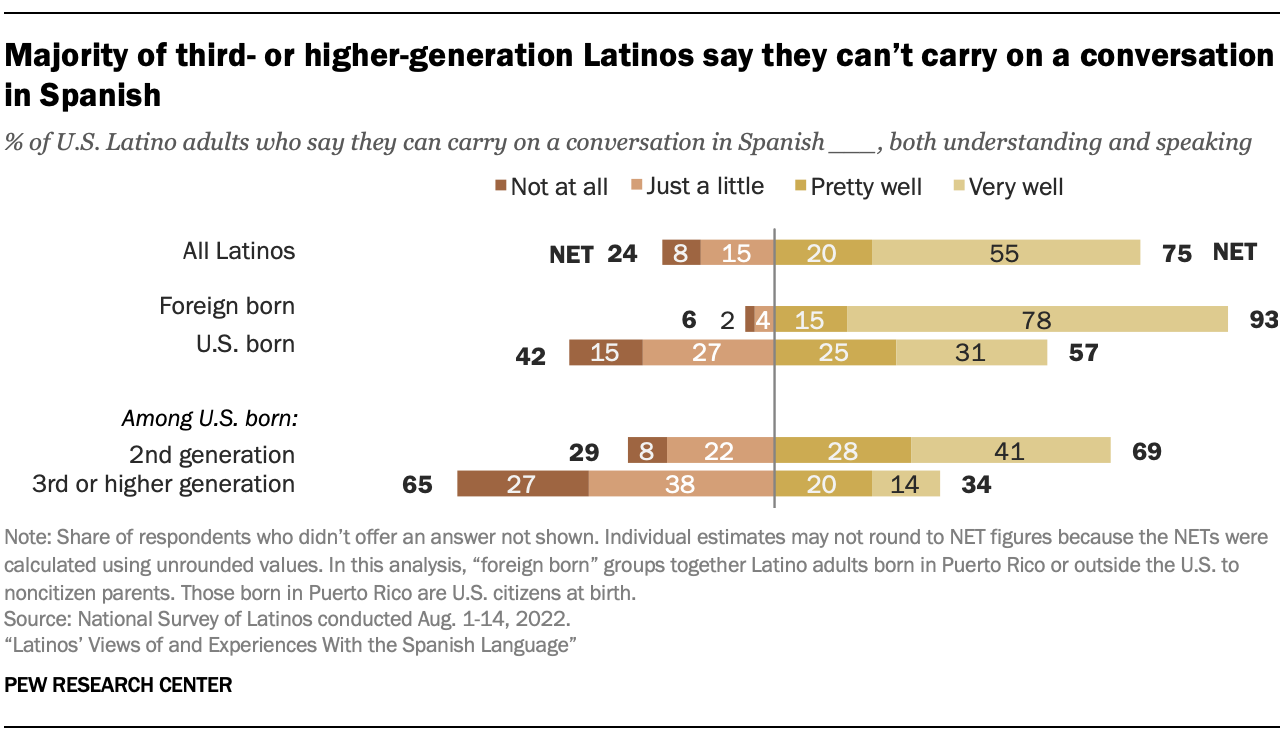
Shame, comments and jokes around not speaking Spanish
For many Latinos, the inability to speak Spanish can result in others shaming them or making jokes about their Spanish.
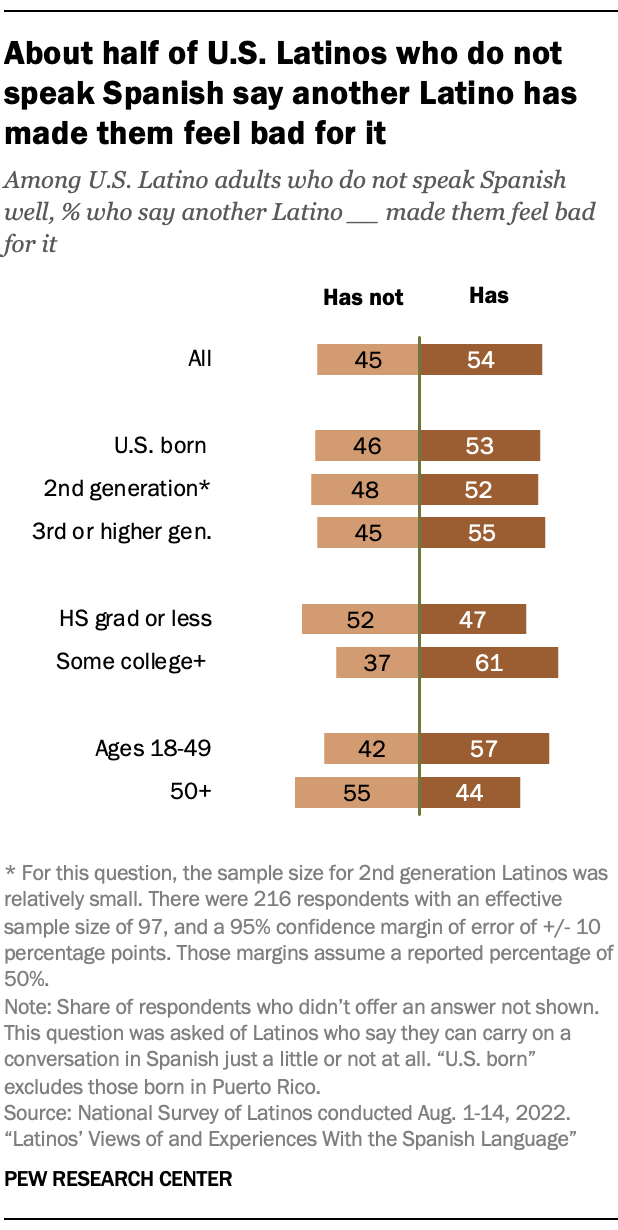
Recently, a video of a young Mexican American soccer fan’s struggle to answer a reporter’s questions in Spanish went viral, sparking online ridicule of his parents for not teaching him Spanish.
This type of shaming around Spanish is not new. During the 2016 presidential primaries, Sen. Marco Rubio questioned Sen. Ted Cruz on his Spanish-speaking ability. Some took this as Rubio implying Cruz was not “Latino enough.”
This shaming could have impacts on whether Latinos who do not speak Spanish feel “Latino enough,” a sentiment award-winning actor Ariana DeBose has expressed.
Among U.S. Latinos who say they can carry on a conversation in Spanish a little or not at all:
- 54% say another Latino has made them feel bad for it.
- Roughly six-in-ten with at least some college experience say this has happened to them, while 47% of Latinos with less education say the same.
- 57% of 18- to 49-year-olds report being shamed by other Latinos for not speaking Spanish well. Meanwhile, 44% of those 50 and older say they have had this experience.
Among all Latinos, many often hear comments or jokes about Latinos who do not speak Spanish.
- 40% of U.S. Latinos say they often or extremely often hear family and friends make jokes or comments about other Latinos who cannot speak Spanish.
- Another 29% say this happens sometimes.
How Spanish language use is linked to perception of these jokes and comments
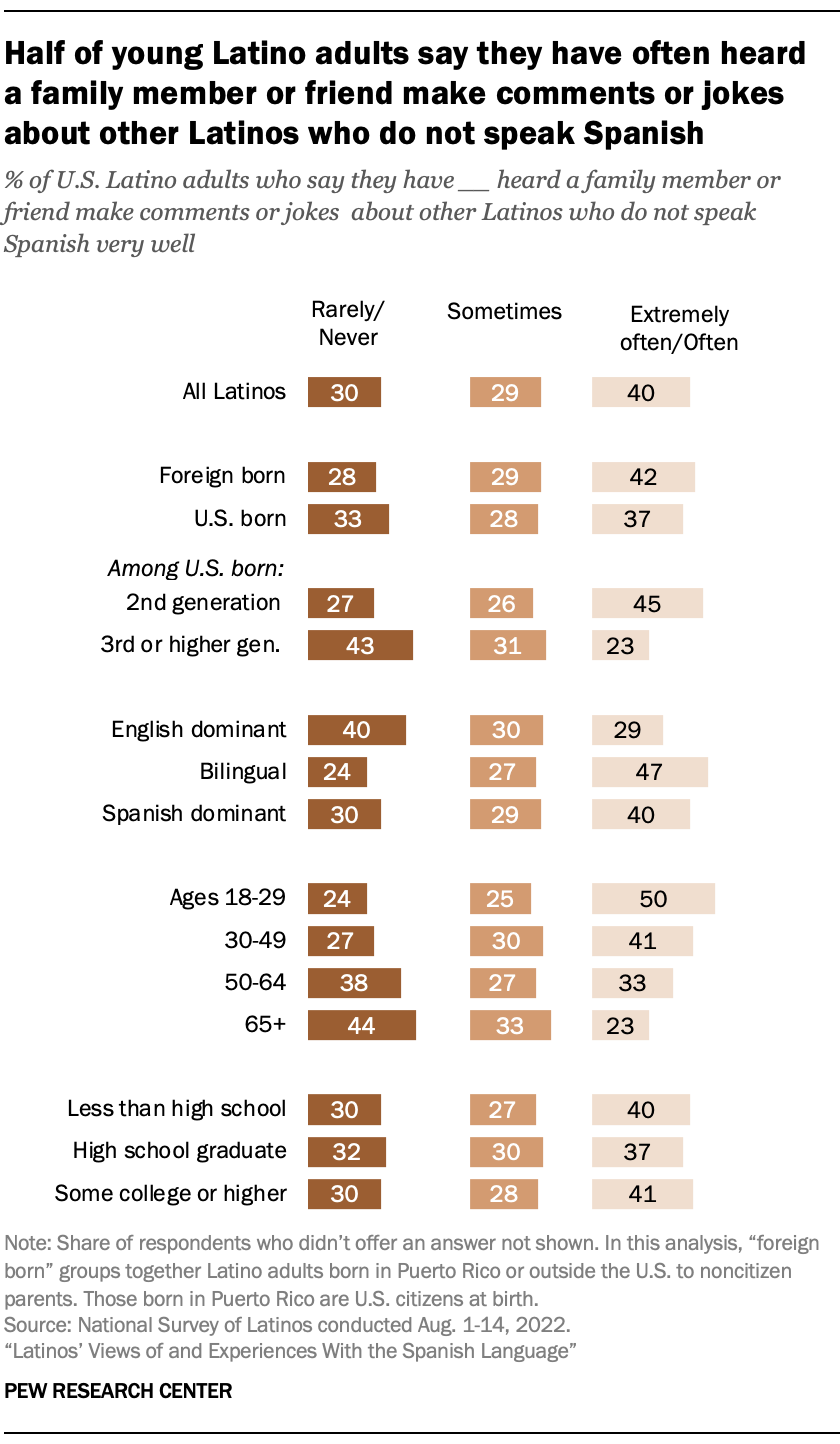
Latinos’ experiences of how often family members or friends comment and joke about others not speaking Spanish well are strongly related to whether they are Spanish dominant, bilingual or English dominant.
- Bilingual Hispanics (47%) are more likely than English-dominant or Spanish-dominant Hispanics to say these types of comments happen extremely or very often.
- Four-in-ten English-dominant Hispanics say these comments rarely or never happen.
Age
Age is also a factor in how often Latinos say jokes about Spanish-speaking abilities happen.
- Half of young Hispanic adults – those ages 18 to 29, the least likely age group to be able to carry on a conversation in Spanish – say these jokes or comments happen extremely or very often, significantly higher than all other age groups.
- Latinos 65 and older (44%) are more likely than some younger groups to say these comments and jokes rarely or never happen.
Spanglish use
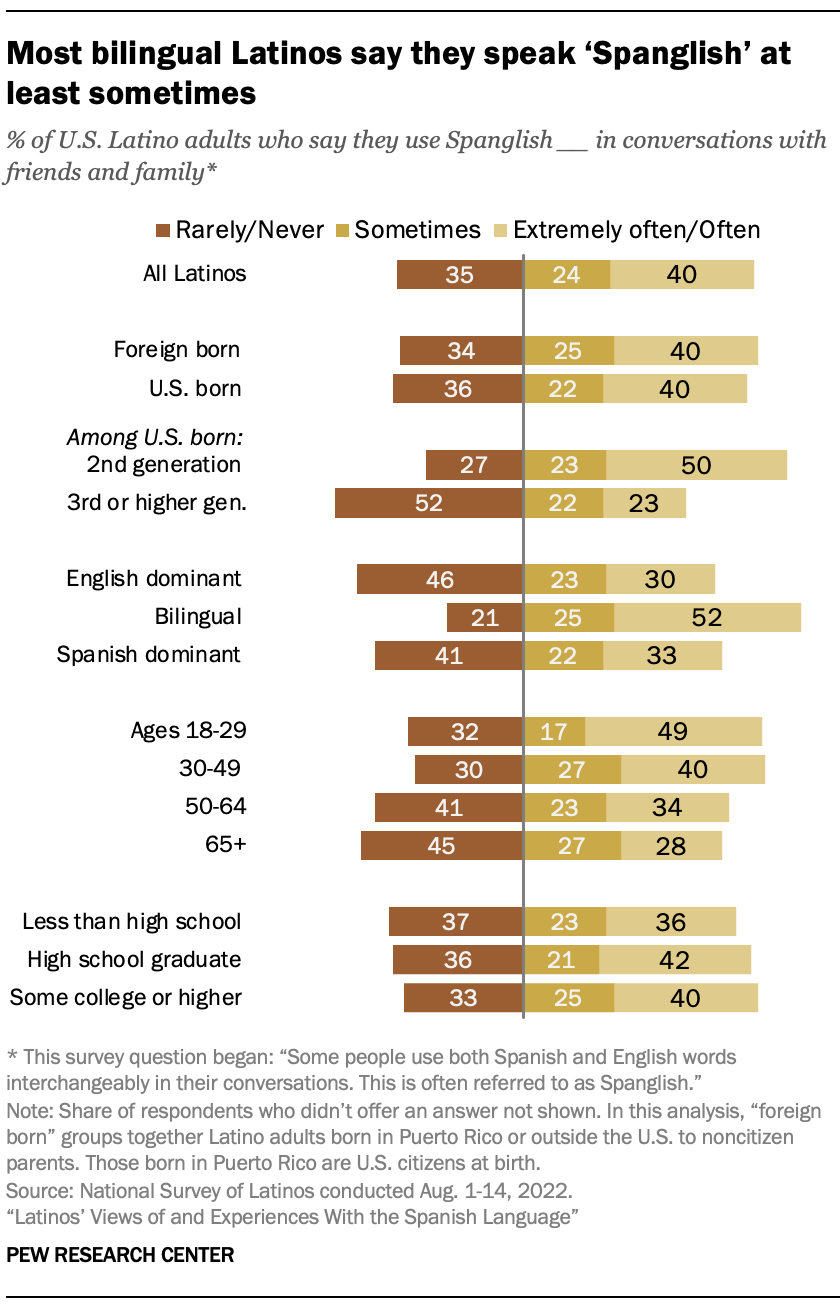
“Spanglish” is the practice of using words from both Spanish and English interchangeably when speaking. It is such a common practice that it appears in both the Royal Spanish Academy and Oxford English dictionaries.
A majority of U.S. Latinos (63%) say they use Spanglish at least sometimes, including 40% who say they do so often.
Immigrant status and generation
Immigrant status and generation is linked to how often one uses Spanglish.
- Second-generation Hispanics are more likely than third- or higher-generation Hispanics to say they use Spanglish at least sometimes (72% vs. 45%).
- About half (52%) of third- or higher-generation Hispanics say they rarely or never do so.
How English and Spanish ability is linked to Spanglish use
Bilingual Latinos are more likely to use Spanglish than English- or Spanish-dominant Latinos.
- Most bilingual Latinos report using Spanglish at least sometimes (77%), with about half (52%) saying they do so very or extremely often.
- 54% of English-dominant and 56% of Spanish-dominant Latinos say they use Spanglish at least sometimes.
- 41% of Spanish-dominant Latinos say they rarely or never use Spanglish, about twice the share among bilingual Latinos (21%).
Links between Hispanic identity and views about Spanish
Among U.S. Hispanics who consider their Hispanic identity to be extremely or very important to how they view themselves:
- Nearly all (94%) say it is at least somewhat important that future generations of Hispanics in the U.S. speak Spanish, with 79% saying it is very or extremely important.
- 25% believe someone must be able to speak Spanish to be considered Hispanic.
- About half (49%) say they often hear jokes or comments from family or friends about Hispanics who do not speak Spanish.
All three of these measures decrease among those who see less importance in Hispanic identity.
